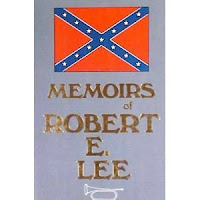For the funeral of General Robert E. Lee the town of Lexington, Virginia, came to a standstill. The students and faculty of Washington College (later Washington and Lee Univ) and the cadets of Virginia Military Institute were all present for the burial procession, as it snaked through both campuses before concluding at the Washington College Chapel where the body was entombed. CSA artillery general and Episcopal priest W.N. Pendleton presided over the service and the internment of Lee’s body in a crypt in the floor of the Chapel. Thus concluded the life of the able warrior.
The Memoirs of Robert E. Lee, published in 1887 by A.J. Long, Lee’s former military secretary, is a narrative of Lee’s life from birth to death, using his personal first hand observations, military records, and anecdotes provided by others present on General Lee’s staff during the Civil War, Long pens a concise account of Lee’s life, focusing primarily on the events and battles of the Civil War where General Lee was present.
Counting his years as a West Point Cadet, Robert Edward Lee spent 40-years of his life in the military uniforms of both the United States and Confederate States of America. An honor student at the Academy, after his graduation Lee served as a combat engineer for many years, where he worked in a broad capacity from constructing fortifications on the Atlantic coast to developing ports on the Mississippi River. During the Spanish-American War he distinguished himself on the staff of General Winfield Scott as both an engineer and a scout, showing himself to be a rising star in the officer ranks. After a stint as the Superintendent of West Point, where he saw his eldest son graduate first in his class, Lee transferred to the cavalry and joined the command of Col. Albert Sidney Johnston in Texas. Here he worked at keeping the settlers and towns of Texas safe from Indian attack. His last command in the US Army was as commander of the First Regiment of Cavalry. In April, 1861 Lee turned down a promotion to Major-General and resigned his US Army commission, preferring to return to his beloved Virginia stating, “My heart is broken, but I can not raise my sword against Virginia.”
Long’s account of Lee’s time as Commanding General of the Army of Northern Virginia and General-in-Chief of Confederate Forces is somewhat biased, detailing Lee's trumphs and offering justifications for Lee’s presumed missteps. He paints his commander as a family man with high character and a deep respect for soldiers, regardless of which side of the cause they fought on. Long describes each battle, from Lee’s first battlefield encounter with Union forces at Cheat Mountain, to his surrender of the Army of Northern Virginia at the McLean house in Appomattox.
I recommend this book to anyone who has an interest in American history, for an understanding of America can not be divined without a general knowledge of the Civil War, its causes and its heroes.

No comments:
Post a Comment